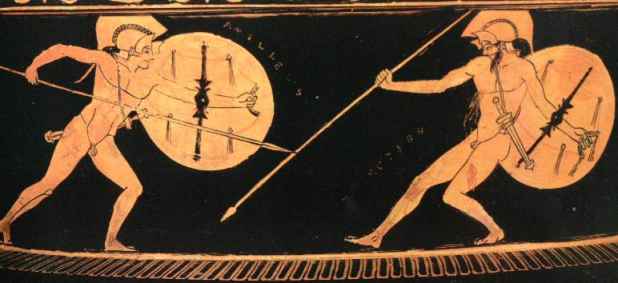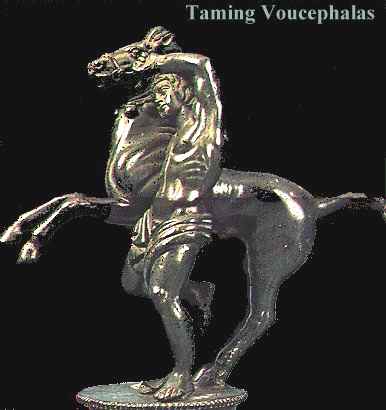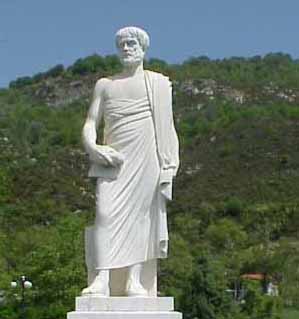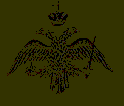Youth
"My parents learned me to live, but my teachers learned me to live right."
Alexander
was born July 356 BC (on the same day on which the famous Temple of Artemis at Ephesus was destroyed by fire),
at Pella in Macedonia. His father was Philip II, king of Macedonia and his mother
Olympias (daughter of King Neoptolemus of Epirus).
Always he alleged that he descended from Heracles (Hercules) and Achilleas (Achilles).
Plutarch writes: " As for the lineage of Alexander, on his father's side he was a descendant of Heracles through Caranus,
and on his mother's side a descendant of Aeacus through Neoptolemus; this is accepted without any question."
Since he was a boy he was inspired by the
Homeric heros
and he slept with Iliad under his pillow.
Iliad and Odyssea are the main books that educate Hellenes continuously for thousands years. In 11th century,
Anna Comnena recited by heart whole parts from the homeric epics.
 Alexander also read books written from, Herodotus of Halicarnassus (480-425) and Xenophon (430-355),
both writers of books about wars against the Persians.
He was fearless, bold and exposed himself to any danger. He participated in his father's huntings and one day he was almost killed by a lion.
When he was thirteen, his father brought to him as present a magnificent black horse, which he had bought from
Thessaly for the enormous sum of 13 talents. Nobody could ride him, but Alexandros noticed that the animal was afraid from
his own shadow. So he turned the horse to face the sun and stroking him whenever he became eager and fiery managed to ride
him. Then Philippus told to his son:
"My son, seek out a kingdom worthy of yourself, for Macedonia is too little for you".
He named the horse Voucephalas (vous=ox, cephalas=head, of course another greek name) and this horse whould carry him
all the way to India.
Alexander also read books written from, Herodotus of Halicarnassus (480-425) and Xenophon (430-355),
both writers of books about wars against the Persians.
He was fearless, bold and exposed himself to any danger. He participated in his father's huntings and one day he was almost killed by a lion.
When he was thirteen, his father brought to him as present a magnificent black horse, which he had bought from
Thessaly for the enormous sum of 13 talents. Nobody could ride him, but Alexandros noticed that the animal was afraid from
his own shadow. So he turned the horse to face the sun and stroking him whenever he became eager and fiery managed to ride
him. Then Philippus told to his son:
"My son, seek out a kingdom worthy of yourself, for Macedonia is too little for you".
He named the horse Voucephalas (vous=ox, cephalas=head, of course another greek name) and this horse whould carry him
all the way to India.
 Alexander is said to have impressed envoys form Persia when he was six years old, when he kept asking
questions about the Persian empire.
According to Plutarchus,
when the young prince was informed for his father's victories he said: "Oh, my father is going to conquer the whole
world and he will leave nothing for me to conquer." He didn't like wealth (ploutos) or pleasure (idoni) or comforts but
virtue (arete) action (agon) and glory (doxa).
Alexander is said to have impressed envoys form Persia when he was six years old, when he kept asking
questions about the Persian empire.
According to Plutarchus,
when the young prince was informed for his father's victories he said: "Oh, my father is going to conquer the whole
world and he will leave nothing for me to conquer." He didn't like wealth (ploutos) or pleasure (idoni) or comforts but
virtue (arete) action (agon) and glory (doxa).
His first teacher was the austere and ascetic Leonidas of Epirus, and later he was
replaced by Lysimachus the Acarnanian.
His classmates were also his best friends: Hephaestion, Perdiccas, Krateros, Ptolemeos, Selephcos, Philotas, Leonatus.
(Greek names end to -os, -on, -as, -es, while sqopian names end to -ov, -ev, -of).
His first love was a slave whom he had set free, and he named her Leptini (=thin, of course another greek name), who was
faithfull to him like a dog. Philip did excellent when he appointed the best of philosophers, the supreme intellectual, the
Macedonian Aristotle, son of Nicomachus as Alexander's tutor.
(Really do sqopians claim Aristoteles as theirs?)
 Alexander when he was thirteen, together with his friends, continued his education at Mieza;
it was the great Greek philosopher himself who introduced him to the world of arts and sciences.
Phillip had spent a fortune to provide the school with all the necessaries. Mathematics, Geometry, Geography, Biology, Astronomy,
Medicine, Physics, Philosophy were some of the lessons that Alexandros was taught at Mieza.
Some other brilliant figures had also come at Mieza to meet the young prince. Lysippus the sculptor,
Apelles the painter, Callisthenes the writer.
Phillipus had once said that Alexandros was lucky to live the same time that Aristoteles.
He was right,
Aristotle conquered the world with the meditation, and his student Alexander conquered the
world with the sword.
Alexander when he was thirteen, together with his friends, continued his education at Mieza;
it was the great Greek philosopher himself who introduced him to the world of arts and sciences.
Phillip had spent a fortune to provide the school with all the necessaries. Mathematics, Geometry, Geography, Biology, Astronomy,
Medicine, Physics, Philosophy were some of the lessons that Alexandros was taught at Mieza.
Some other brilliant figures had also come at Mieza to meet the young prince. Lysippus the sculptor,
Apelles the painter, Callisthenes the writer.
Phillipus had once said that Alexandros was lucky to live the same time that Aristoteles.
He was right,
Aristotle conquered the world with the meditation, and his student Alexander conquered the
world with the sword.
The new king of Macedonia
In 336 B.C., Philip was assassinated and Alexander became the new king of Macedonia. Alexander was immediately presented to the army, who already knew the bravery and the competence of the young man. They had seen him how he fough in Thrace, how he conquered the city Maedi and renamed her Alexandroupolis. They had seen him at the battle of Chaeronea, at the age of seventeen, where he had charged fearless against the enemy and had broken the Theban Sacred Band. The two old generals and friends of his father, Parmenion and Antipatros supported him. He was only 20 years old.
The barbarian tribes to the north (Illyrians, Paeonians and Triballians) revolted and attacked to the Macedonian garrisons.
Alexander didn't waste his time and marched against them. He defeated his enemies and crossed even Danube where he fought
Getae and Celtic tribes. But also the demagogue Demosthenes didn't waste his time and spread the rumour that Alexander
had been killed. The first to act were the Thebans who attacked to the Macedonian garrison at Cadmea (Thebes' Acropolis).
Enraged Alexander, in only two weeks, marched 500 kilometers from Illyria to Thebes and appeared before the walls of the city,
demanding that the two leaders of the rebellion (Phinix and Prothetos) should be sent to him.
There he received insults from some Thebans who shouted that Persians were coming to liberate their city from the tyrant.
The neighboring cities, Plateae, Phocis and Orhomenos, who had suffered from the cruelty of Thebe, asked for revenge and
demanded from Alexander to show no mercy, telling him also (according to Diodorus) that Thebans had fought on the side of
Persian Xerxes, against the other Greek cities, when he had invaded Greece.
Macedonians, Thespeans, Phoceans, Orhomenians attacked and the town was razed to the ground, except for its temples and the
house of the poet Pindaros (Pindar), who had once written an ode to the
Macedonian king Alexander I. Six thousand inhabitants were executed and thirty thousand were sold as slaves.
No other city was harmed and again
all Hellenic representatives (except Spartans)
were gathered in Corinth and the Corinthian league declared Alexander as Autocrator (emperor) of all Hellenes.
Plutarch writes about this declaration. Would the Greeks apppoint as their hegemon (leader) a barbarian?
Diogenes from Sinope of
Pontus
was a cynical philiosopher who lived in a pot.
 He taught that people should live as simple as the dogs (cynas=dog)
He didn't possess anything but a cup to drink water. When some day he saw a boy drinking water using his hands, he threw
the cup away. Alexandros, who one day would possess the whole world, met
Diogenes at Corinth:
He taught that people should live as simple as the dogs (cynas=dog)
He didn't possess anything but a cup to drink water. When some day he saw a boy drinking water using his hands, he threw
the cup away. Alexandros, who one day would possess the whole world, met
Diogenes at Corinth:
"Hello, I am Alexander the king.
"I am Diogenes."
"I would do everything for you. Just ask for it.
"Anything?"
"Yes anything."
"Step aside because you hide the sun."
Later the young hegemon ton Hellinon visited the Delphi's oracle. But Pythia wasn't ready yet to give her prophecies.
Alexander forced her to go to her place and she said "Ah, young man, nobody can resist to you."
Alexander heard what he wanted to hear, and left. This oracle would be true till the end
Liberation of Mikra Asia (334)
Ancient Greeks suffered from the rapaciousness of Persians, like the medieval Greeks (Byzantines) suffered from the Ottoman rapaciousness. The unbounded persian empire had conquered the greek cities of Pontus and Minor Asia, and had failed to conquer also the european greek cities. Greeks always wished to liberate the Greek cities and take revenge from the barbarian invaders. Philippus didn't make it, but Alexandros as Autokrator of Hellenes, made the preparations to achieve this goal. So in the spring of 334 he crossed the Dardanelles, leaving Antipatros to Pella, who had already faithfully served his father.
He started the expedition with 30000 men (15000 were Macedonians), and was going to face an enemy with hundreds of thousands of troops. He had with him fighters from all over Greece except Sparta. Alexander's second in command was Parmenion, the veteran general, who had secured a foothold in Asia Minor during Philip's lifetime. The army was accompanied by engineers, architects, scientists, court officials, and historians. (Callisthenis of Olynthos, Anaxarhos of Abdyra, Pyrron, Heracledes of Argos, Denocrates of Rhodos, Cleon of Syracusses, Xenocrates of Chalcidon are some of the intellectuals who took part to the campaign). The core of the infantry was the Macedonian phalanx, armed with the long sarissa; the pick of the cavalry were the Companions (Hetairoi), led by Alexander himself on the right wing. Parmenion commanded the Thessalian cavalry on the left. There also were machines--stone-throwing siege engines that could be assembled on the spot. The siege engineers enabled him to conquer many fortified cities. Nearhos was appointed as admiral of the fleet, a fleet which would follow sailing by the Minor Asia's coasts. The majority of the 160 galleys of the united greek fleet was athenian. Alexandros had only 70 talents for their pay, and no more than thirty days' provisions. As his ship approached the Asia Minor's coast (port of Eleounta), he threw his spear from abroad and stuck it in the ground declaring that he was the master of Asia. He set first his foot to Asia, like Protesilaos had done, according to Homer's Iliad. He did offers to Dias (Zeus) and Athena and constructed shrines for the gods and for Hercules. (Alexander like all other Greeks believed to the Olympian gods, and admired the mythic heroes that all Greeks admired and still admire: Heracles, Achilleas, Ector, Odysseas, Diomedes, Aeas, Menelaos, Theseas). Like a true Hellene, at Ilion (Troy) he visited the tombs of the heroes Achilles and Aeas (Ajax), paying them due religious honour. The Spartan king Agesilaus, who had attacked to Persians in Asia sixty years before, had done the same. From the Trojan temple of Athena, the king took a sacred shield, which would save Alexander's life in India. According to Plutarch "At the tomb of Achilles, who was his ancestor on his motherís side, Alexander anointed the gravestone with oil and then ran around it naked with his companions, according to the ancient custom. Achilles, he said, was a lucky man to have had a good friend while he was alive and a good poet to preserve his memory after he was dead."
 _____
_____






